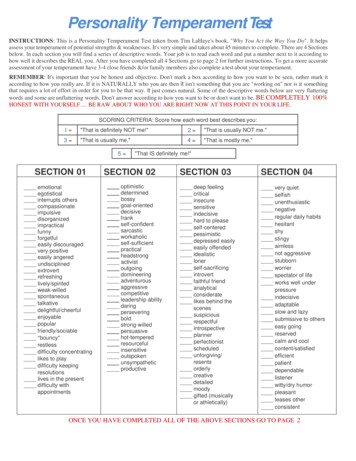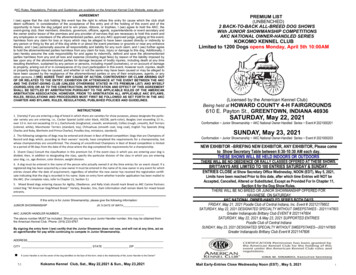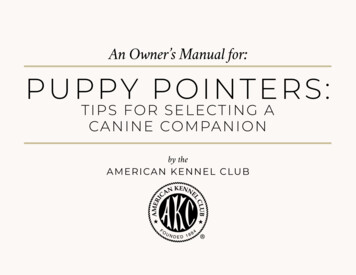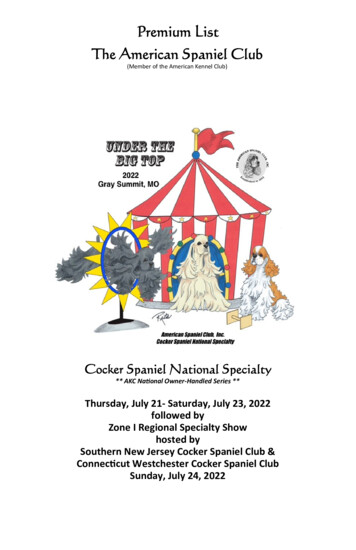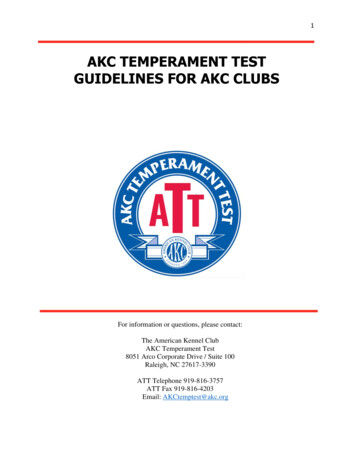
Transcription
1AKC TEMPERAMENT TESTGUIDELINES FOR AKC CLUBSFor information or questions, please contact:The American Kennel ClubAKC Temperament Test8051 Arco Corporate Drive / Suite 100Raleigh, NC 27617-3390ATT Telephone 919-816-3757ATT Fax 919-816-4203Email: AKCtemptest@akc.org
2AKC TEMPERAMENT TEST (ATT) GUIDELINE SECTIONSSection 1. PurposeSection 2. Conducting & ScoringSection 3. General InformationSection 4. How the ATT is ConductedSection 5. Eligibility: ClubsSection 6. Eligibility: DogsSection 7. Evaluators and StewardsSection 8: Ribbons and RosettesSection 9: Entries and RefundsSection 10: ATT Equipment for the TestSection 11: Submission of ResultsSection 12: AKC Temperament Test TitleSection 1. PurposeThe AKC Temperament Test (ATT) is a general temperament test for all breeds and mixed breeddogs that will assess the dog’s reaction to a variety of stimuli. These stimuli will be in thefollowing six categories: Social, Auditory, Visual, Tactile (touch), Proprioceptive (motion) andUnexpected Stimuli.The purpose of the ATT is to test for fear, shyness, inability to recover, and lack of cooperation.Desired traits are that the dog will be emotionally stable, inquisitive, appropriately social for itsbreed, biddable, and demonstrates the ability to recover from a startling situation in a reasonableamount of time. Dogs who show signs of aggression will not pass the test.Section 2. Conducting and ScoringThe regulations for conducting and scoring the test are in the ATT Evaluator Guide available atwww.akc.org/akctemptest
3Section 3. General InformationThe ATT is a noncompetitive pass-fail test. In a test, a dog must pass 3 test items in each of thesix categories (total of 18 test items). These are selected from a list of 24 possible test items.All dogs who pass the ATT twice under two different approved ATT Evaluators may earn theAKC Temperament Test (ATT) Title.The ATT is administered only by AKC licensed or member clubs. The ATT may be held inconjunction with another AKC event or as a standalone (AKC club) event.The Social category is always administered first so the evaluator can do a quick assessment ofthe dog to ensure that it is under the handler’s control. Evaluators will decide the order in whichthe remaining categories are administered.When two tests are given on the same day or on back-to-back days, following the Socialcategory which is always administered first, the order of some of the test categories (Visual,Tactile, etc.) should be changed so there is some variability from one test to the next.Further, when two tests are given on the same day or on back-to-back days, the 6 test items (1per category) that were not tested in the first test should replace an item for the second test. Forexample, for the Auditory category, the test item choices are: shake bottle with coins, vacuumcleaner, whistle and bike horn. The ATT must include three items from each category. So, if amorning test included the bottle, vacuum cleaner and whistle, in the afternoon, one of the threeitems would be replaced with the bike horn.The wire grate must be one of the choices for Tactile in every test, and the umbrella must alwaysbe included as a Visual item.Breed Temperament Information: One purpose of the ATT is to educate dog owners about thetemperament of their breeds. At each test, in addition to a title application form and their contactinformation on the evaluator’s checklist, handlers complete the form labeled, “Your Breed’sTemperament.” The form includes a space for the handlers of mixed breed dogs to write aboutthe temperament of their individual dogs. Clubs are required to print the Breed TemperamentGuide (www.akc.org/akctemptest) and have copies on the registration table and/or a poster.Collars, Leashes: Dogs may wear slip collars that are on the dead ring, buckle collars,martingales and body harnesses in the ATT. They may not wear prong collars, head collars, ecollars, or harnesses that restrict the movement of the dog. Leashes should be 4ft. to 6ft. long andshould be made of fabric or leather.Event Application: An AKC official event application is available online and should besubmitted to AKC for approval of a club’s AKC Temperament Test a minimum of 30 days inadvance of the test date. If the club has two ATTs on one day, or the ATT is held on consecutivedays, each test counts as a separate event and a separate event application is needed.Excusals: The evaluator should excuse dogs from the ring immediately if they show any signs ofaggression or soil the ring (urinate or defecate). Handlers may be dismissed for excessively
4talking to the dog, refusal to follow the evaluator’s instructions, or for making corrections. Theevaluator may discontinue testing if he/she determines the dog is too fearful or under duress tocomplete the testing.Disqualifications: AKC’s standard procedures for disqualification by judge/evaluator or byevent committee apply to the AKC temperament test.Judging Limits: There are no judging limits with regard to the number of dogs that may betested in the ATT. The test takes an average of 6-minutes per dog, so roughly 10 dogs per hourcan be tested. Clubs may establish a maximum entry for their ATT event.Liability: The ATT is only held at AKC events. Passing the test simply means that the evaluatorsaw the dog successfully perform the test items at the test. There is no expectation that passingthe ATT guarantees any future behavior of the dog.Locations: The ATT is held in conjunction with AKC events (e.g., dog shows, obedience trials)or as a standalone event (e.g., test night at a club). The club holding the event will select thelocation.Mileage/Date Conflicts: There are no restrictions pertaining to dates and/or mileage conflictswith other events. This means that two clubs that are close by may hold an ATT on the same day.Club are allowed to hold a maximum of two tests per day.Required Paperwork: Clubs are required to submit the official AKC event application no laterthan 30 days from the date of their test. The event application as well as the ATT forms neededfor the test can be found at: www.akc.org/akctemptestThe forms needed for testing include:1.2.3.4.5.ATT Title Application for every participantATT Test Forms (Evaluator Score Sheets) for every participantYour Breed’s Temperament Form for each participantRecord of All Dogs TestedTest Summary Form to be completed online by the evaluator within 7 days of thetest so the event can be officially closed and titles issued.If the dog passes the ATT, the evaluator provides the dog owner with the ATT Title Applicationand the ATT Evaluator Score Sheet to send to AKC to request their dog’s title.If the dog does not pass the test, the evaluator should keep the Evaluator Score Sheet. Theresults from dogs that did not pass will be needed to complete the online Test Summary Form.The names of handlers and/or dogs who did not pass the test will not be sent to AKC. These“did not pass” Evaluator Score Sheets will be used to report the test items not passed (e.g., V1,T3, P4) on the online Test Summary Form.
5Misconduct Issues: Should a written complaint be submitted to the committee during the event,the committee must address the complaint according to the procedures provided in the “Dealingwith Misconduct” guide for event committees.Owner: Once the dog has passed the ATT twice, the dog owner sends a copy of the ATT TitleApplication, two Evaluator Score Sheets from each passing test and the application fee.Premium List: Clubs are required to provide a premium list for their test. All standard AKCpremium list information should be included. Clubs must state if entries are limited and if so howmany, dates/start times, entry fee, type of entry - advanced or day of entries, direction on how toenter, contact information for the secretary, the chair, committee, ATT evaluator(s), location.The premium list must state if the ATT will be open to all breeds or restricted to certain breed(s).If the test is restricted and the entries are limited, the club must state whether special priority willbe given to those restricted breeds.Repeating a Test Item: Dogs may not repeat test items in these categories: Social, Auditory,Visual and Unexpected Stimulus. Dogs may attempt test items a total of 3 times for the Tactileand Proprioceptive categories. Scores are adjusted accordingly when test items are repeated.Retesting: If a dog does not pass the ATT, it may take the test again as soon as the handler feelsthe dog is ready. If there are two tests on the same day (e.g., morning and afternoon) and the dogdoes not pass the morning test, it may retest in the afternoon.Size (of ring): The layout of the ring is determined by the evaluator. A ring should be at least 40x 50 ft., but it may be larger. Larger rings provide more flexibility with regard to layout.Substitution of an Evaluator: In the event that an evaluator needs to be replaced after the AKCEvent application has been submitted, this should be noted on the Test Summary Form.Test Summary Form: The evaluator must submit the online ATT Test Summary form within 7days of the test so that the event can be closed out and the titles awarded. The Test SummaryForm takes only a few minutes to complete. See: www.akc.org/akctemptestTitle (requirements for): The AKC Temperament Test (ATT) title is a suffix title. The dogmust pass the ATT two times under two different evaluators. The dog owner must submit theATT title application, the two evaluator Score Sheets from each passing test, and the 25 titleprocessing fee to receive the ATT title.Section 4. How the ATT is ConductedSee the ATT Evaluator Guide for details (including set-up, protocol, distances, etc.) onconducting each of the test items.Section 5. Eligibility: ClubsAll AKC licensed or member clubs are eligible to hold the ATT. The test may be held inconjunction with another AKC event (e.g., show, trial) or as a stand-alone (AKC club) eventsuch as at a club’s test night.
6Section 6. Eligibility: DogsDogs who are at least 1 year of age are eligible to take the ATT and must either be AKC or FSSregistered or listed with Canine Partners or have a Purebred Alternative Listing number. Dogsthat are spayed or neutered may participate. Dogs must be able to perform whole categories ofthe test (such as hearing auditory stimuli and seeing visual stimuli), in order to be eligible to earnan ATT title. Dogs with disabilities such as those that are blind, deaf, or have three legs areeligible to enter provided in the opinion of the evaluator they display no signs of physicaldiscomfort and can safely complete the test. However, if a dog has multiple disabilities suchthat, it is unable to complete whole categories of the test (i.e. - hearing auditory stimuli andseeing visual stimuli), the dog would not earn the ATT title.Section 7. Evaluators and StewardsThe evaluators for the ATT must either be approved AKC licensed judges of obedience or rallyor be an approved CGC evaluator. The person who conducts the ATT testing is referred to as the“ATT Evaluator.” All ATT Evaluators must go through an approval process that involvescompleting an ATT Evaluator application, logging in to Canine College online and completing 4online training modules and passing an online exam consisting of approximately 30 questions.Responsibilities of Evaluators: Evaluators are responsible for working with the club to plan thetest, designing the layout of the test, training the stewards on using the test equipment and whento deliver the stimulus, conducting the test, providing handlers with the required paperwork, andsubmitting the required online Test Summary Form within 7 days after the test so that titles canbe issued. The evaluator and club work together to determine who will provide the materials forthe test (teeter, PVC ladder, etc.) At the test, the evaluator must also complete the “Record of AllDogs Tested,” a short form that lists the owner and dog name and whether or not the test waspassed. Evaluators are required to retain “Record of All Dogs Tested” form for a period of 1year.Stewards: The assistants in the ATT are referred to as “stewards.” The stewards are selected bythe evaluator or club. Stewards should be trained by the evaluator on how to use the testmaterials and when to present/activate the stimuli prior to the start of the test.Number of Evaluators and Stewards: There will be one ATT evaluator per test. The evaluatorjudges the dogs and records the scores on the test form. The number of stewards per test will bedetermined by the evaluator and club. For most tests, in addition to the evaluator, a minimum of3 stewards would be needed. One would handle sign-ins, and the other two would assist with theAuditory, Visual and Unexpected Stimulus parts of the ATT.Another sample plan for staffing the ATT is: In addition to the evaluator, the following plan with5 stewards provides more than ample help. 1 steward at the registration table 1 steward for Auditory 1 steward for Visual 2 stewards in the tent for the Unexpected Stimulus. (When the test starts, one ofthese stewards moves to the Social area to assist the evaluator.
7Section 8. Ribbons and RosettesClubs holding an ATT shall offer a ribbon or rosette to each dog that passes the test. Whenribbons are produced by the club for the ATT, each ribbon or rosette shall be at least two incheswide and approximately eight inches long. The ribbons shall bear on its face a facsimile of theseal of the AKC, the words “AKC Temperament Test,” the ATT logo, the word, “Qualifying,”and the name of the test giving club. Flat ribbons shall be white in color, and rosettes shall beblue with a white center streamer and white button. Additional information such as date, clubname and location may appear on the ribbon/ rosette or may be affixed on the back with labels.Clubs may also order generic ATT ribbons and rosettes for participants e-good-citizen-materials-for-evaluatorsSection 9. Entries and RefundsEntry fees are determined by the club. Clubs also decide how entries will be taken, the closingand opening of entries and whether there will be limits. Clubs may at their option choose toaccept day of test entries. There will be no refunds for bitches in season as they are allowed toenter. All other decisions regarding refunds are at the discretion of the club. A dog may enteronly once per test and one test is defined as one event number. A dog may not be entered underan evaluator they own or co-own.A club, at its discretion, may allow for a reduced entry fee for dogs handled by juniors.The reduced entry fee shall be published in the premium list. A junior is defined as someone lessthan 18 years of age on the first day of the event. The junior must handle the dog in the class toqualify for the reduced entry fee. If the dog is entered under this provision but the junior does nothandle the dog, the owner must pay the regular entry fee as published.Section 10. ATT Equipment for the TestThe ATT requires a variety of test materials. The host club should carefully review all of the testmaterials to ensure the proper items have been assembled prior to the start of the test. Safety isparamount. The equipment should be constructed to keep safety in mind and should bemaintained in good working order. Photos, details, measurements and sources for purchasing testitems are included in the training module, “Assembling Your ATT Materials.” The ATTmaterials include:SOCIALComputer bag, chair in bag on arm, large purse, etc.AUDITORYLarge plastic bottle (1-gallon milk jug), coinsHand-held vacuum cleanerWhistleBike hornVISUALUmbrellaRoller bag, wagon, crate dolly or cooler on wheelsStreamersHand towelTACTILEWire grate (ex-pen)Plastic tarpPlastic lattice
8Memory foamPeg boardAir mattressPROPRIOCEPTIVE (motion)PVC ladder (e.g., DMWYD rainbow ladder) or low bars/hurdlesHoops (8)Low teeterLow platform (e.g., Klimb )UNEXPECTED STIMULUSLarge boxLarge stuffed animal or dollFolding chair or collapsible chair in bagWalker, wheelchair, or crutchesSelection of unusual clothing (e.g., raincoat, hats, large coat, sun glasses, etc.Section 11. Submission of ResultsEntries in the ATT shall be included on the form, “ATT Record of All Dogs Tested.” This formshould be at each test so evaluators can record which dogs and owners were tested. Followingthe completion of any ATT test, the evaluator is required to complete the online ATT TestSummary Form. This form must be completed no later than 7 days following an event. Thisinformation is necessary in the processing of any ATT title applications. Failure to submit thisonline form in an accurate and timely manner may result in a club fine or revocation of evaluatorstatus.Section 12. AKC Temperament Test TitleIf a dog passes the ATT on two occasions, under two different evaluators, the owner may applyfor the AKC Temperament Test (ATT) suffix title by going online; www.akc.org/akctemptestand submitting the ATT title application along with the Evaluator Score Sheets (one from eachof the two required tests) and the required title application fee. Upon verification, the ATT titlewill be applied to the dog’s record and will appear on the dog’s AKC title record. The titlecertificate will be mailed to the dog’s primary owner of record.Thank you for hosting an AKC Temperament Test!
ATT Telephone 919-816-3757 ATT Fax 919-816-4203 Email: AKCtemptest@akc.org AKC TEMPERAMENT TEST GUIDELINES FOR AKC CLUBS . 2 AKC TEMPERAMENT TEST (ATT) GUIDELINE SECTIONS Section 1. Purpose

